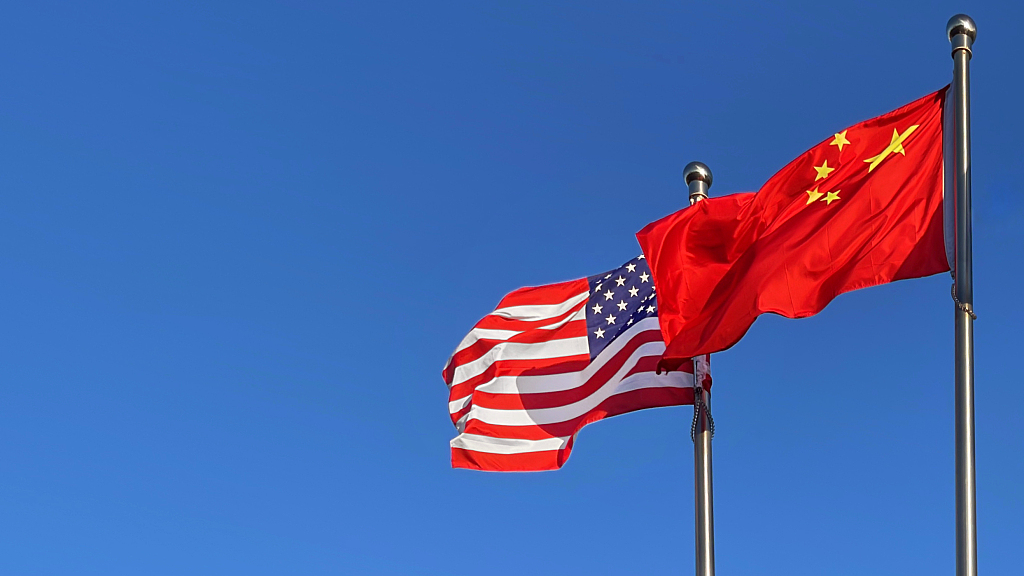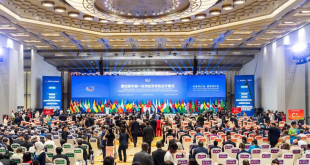Published: August 03,2023
By Xin Ping

National flags of the U.S. and China flutter at the entrance of a Sino-U.S. joint venture in Beijing, China, October 16, 2022. /CFP
Since the Joe Biden administration released its National Security Strategy report in October 2022, the United States has piled on harsh measures to contain China. It has been protracting and intensifying competition with China, including through its recent move to escalate the chip war. The U.S. actions point to a “new Cold War” unilaterally launched by Washington against Beijing. This is a move against the trend of time.
A “new Cold War” is against the will of U.S. society
Over the years, U.S. society has been plagued by myriad problems, especially political polarization, which has long been a source of trouble. Faced with political deadlock, economic inflation and social grievances, politicos from both the Democratic and Republican parties have no capability or even the will to really solve them. Instead, they are trying to shift the internal pressure by hyping up the external “threat” – China.
That said, U.S. entrepreneurs have shown through their actions that they will not buy it. Since the beginning of this year, a slew of U.S. executives has visited China to explore cooperation opportunities. Starbucks’ new global CEO Laxman Narasimhan highlighted China’s huge market potential; Tesla CEO Elon Musk expressly stated his opposition to decoupling and cutting supply chains; Nvidia CEO Jensen Huang made clear that they don’t have a contingency for decoupling, and stressed that “there is only one China.” All these speak volumes about the unique appeal of the Chinese market which embraces openness, fairness and win-win cooperation.
Tourists visit the booth of Tesla at the 2023 World Artificial Intelligence Conference in Shanghai, east China, July 6, 2023. /CFP
As for the American people, though China and the U.S. are far apart geographically, the friendly exchanges between the two countries enjoy a long and rich history. Countless moving stories stand as the evidence: the history of the Flying Tigers during World War II, the story of “Kuliang Friends” in east China’s Fujian Province, and the Sino-U.S. friendship house in Muscatine, Iowa. The list goes on. State-to-state relations are ultimately people-to-people relations. It’s time the U.S. government listened to the voices of the American and Chinese people.
A “new Cold War” is against the interests of the world
Since the outbreak of the Ukraine crisis, European countries followed the U.S. in launching unprecedented sanctions against Russia, which backfired and intensified their own energy crisis and inflation woes. There have since been signs that European countries are starting to rethink its relationship with China. French President Emmanuel Macron publicly opposed the “NATO-ization” of the Asia-Pacific region; EU member states such as Germany, Hungary and Serbia have all made it clear that they will not “decouple” from China.
Unhappy with the U.S. dollar hegemony, Brazil reached an agreement with China to use Chinese yuanfor trade; ASEAN countries decided to increase the use of the Chinese currency in settlement; Malaysian Prime Minister Anwar Ibrahim proposed to China that an “Asian Monetary Fund” be established to reduce reliance on the U.S. dollar. As a Chinese saying goes, a just cause enjoys great support, while an unjust cause gains little traction. The U.S. strategy to encircle China through a “new Cold War” is nothing but an illusion.
A “new Cold War” is based on the misjudgment of the U.S.
The fundamental reason for the current difficulties in China-U.S. relations lies in the strategic misjudgment towards China from the U.S., which has in turn led to a wrong China policy. China always believes that the two countries should get along on the basis of mutual respect, peaceful coexistence and win-win cooperation.
“Planet Earth is big enough to accommodate the respective development and common prosperity of China and the U.S.,” Chinese President Xi Jinping told U.S. Secretary of State Antony Blinken in June. History has repeatedly proven that China and the U.S. can join hands to achieve many great things for the benefit of both countries and the world. Cooperation between the biggest developing country and the biggest developed country can go a long way towards maintaining world peace and stability and contribute to various global causes. For the two countries, there is much potential for future cooperation on a wide range of global issues.
There are too many reasons for the two big elephants in a jungle to live and grow peacefully and make the jungle a better place. The U.S. needs to stop paying only lip service to the need to manage crisis and prevent confrontation. It’s time to walk the talk.
Xin Ping is a commentator on internationals affairs, writing regularly for Xinhua News, Global Times, China Daily, CGTN, etc.
cgtn.com
 Africa -China Review Africa -China Cooperation and Transformation
Africa -China Review Africa -China Cooperation and Transformation
